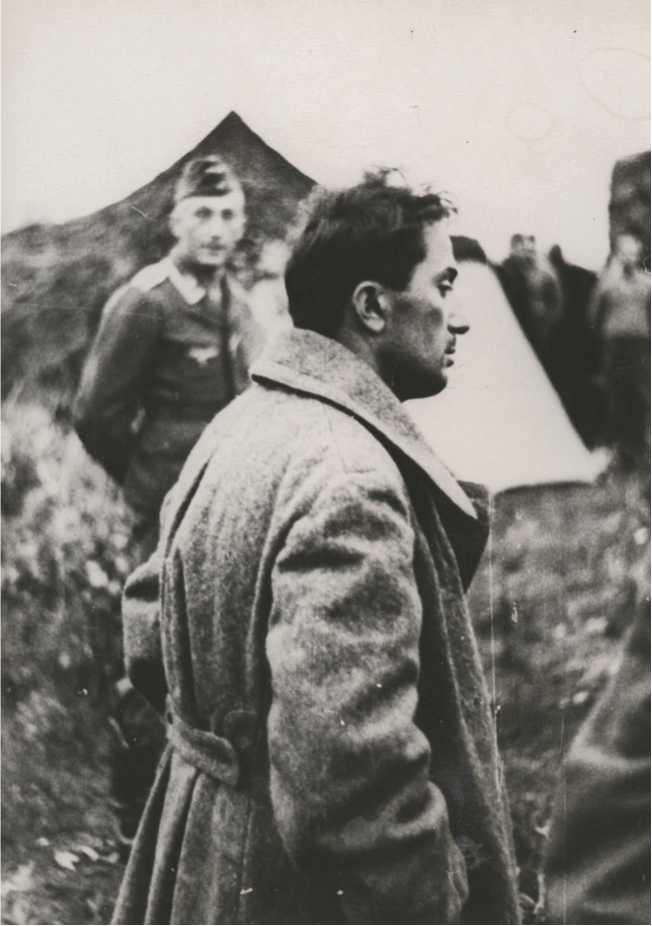At war's end, the fate of POW Yakov Dzhugashvili remained unclear, although there were rumors that he had been sent to a concentration camp and had died there. The Nazis would have wanted to keep such a high-profile captive alive, even if his father (Stalin) had refused offers of an exchange. Maybe Stalin would have a change of heart.
Despite Stalin's apparent indifference to his son's fate, the NKVD conducted an investigation from its headquarters in occupied Berlin at war's end. Deputy minister Ivan Serov summarized the results of his investigation into Yakov's fate in a six-page report from Berlin sent on September 14, 1946, to be read "only personally” by his boss, NKVD head Kruglov. There is no information in the files as to whether this report was passed on to Stalin. Kruglov rarely met with Stalin in person; therefore, he would have reported the results to Stalin in writing. Whether he did tell Stalin will remain unknown.
Serov established that Yakov had indeed been transferred to the

Photograph of Yakov Dzhugashvili (Stalin's son) in German captivity.
Sachsenhausen concentration camp. The former chief of guards of Sachsenhausen, a Gustav Wegner, confirmed that there was a special camp for generals and other highly placed Russian officers within the confines of the Sachsenhausen camp. It was in these special barracks that Yakov was held along with a relative of Molotov. Wegner remembered Yakov well and reported a number of conversations with him. Yakov's only request for special treatment was for newspapers, and he never gave his last name. He kept himself apart from other prisoners and appeared in a depressed state. At the end of 1943, Wegner was informed that Yakov had been killed by guards while attempting to escape. Wegner could not (or did not want to) recount the exact circumstances because the investigation was conducted under the lead of Gestapo chief Heinrich Himmler.
The NKVD's interrogation of the camp commander (a Colonel Kai-nel) also confirmed that Senior Lieutenant Dzugashvili was held three weeks in the camp prison and then, at Himmler's directive, was transferred to the special camp, consisting of three barracks surrounded by a brick wall and high-voltage barbed wire. Kainel reported, consistent with the chief of guards, that Yakov was a solitary figure who shunned contact with other prisoners.
The camp commander reported the circumstances of Yakov's death as follows: The inmates of barrack number 2 were allowed to walk in the early evening in the area outside their barracks. At 7:00 p. m., the SS guards ordered them to return to their barracks. All obeyed except Dzhugashvili, who demanded to see the camp commander. The guard's repeated order went unheeded. As the SS guard telephoned the camp commander, he heard a shot and hung up. Dzhugashvili, in a state of agitation, had run across the neutral zone to the barbed wire. The guard raised his rifle ordering him to stop, but Dzugashvili kept on going. The guard warned that he was going to shoot; Dzhugashvili cursed, grabbed for the barbed-wire gate, and shouted at the guard to shoot. The guard shot him in the head and killed him.
Clearly the unauthorized shooting of none other than Stalin's son set off great apprehension in Sachsenhausen. He had been transferred in by Himmler himself, who hoped to use him as a pawn of some sort. Now, Stalin's son was dead, and no one knew what the consequences would be. Dzhugashvili's body lay stretched across the barbed wire for twenty-four hours while the camp awaited orders from Himmler. The
Gestapo sent two professors to the scene who prepared a document stating that Dzhugashvili was killed by electrocution and that the shot to the head followed. The document stated that the guard acted properly. Dzhugashvili's body was then burned, and the urn with his ashes was sent to the Gestapo headquarters. Indeed, it seemed irrelevant whether Yakov was killed by electrocution or by the bullet. Either way, it was he who committed suicide.
Serov's NKVD interrogators asked for and got an accurate physical description of Dzhugashvili from the camp commander and chief of guards, who also identified him through photographs.
Serov's report ends on a suspicious note that sends a chilling message about NKVD interrogation methods:
In the course of the investigation it was established that the commandant SS Colonel Kainel and the commander of the guards, SS Lieutenant Colonel Wegner, are not telling everything they know, fearing they will be charged with crimes associated with Sachsenhausen. We have established their intent to commit suicide by attacking the guards or by jumping to their deaths. When we got charge of the former officers of the SS Camp Sahchsenhausen from the Americans, they asked us to turn them over to the court. For this reason, we are not able to apply the full measure of physical intervention [the code word for torture] to Kainel and Wegner. But we did organize to have a mole in their cells.




 World History
World History









